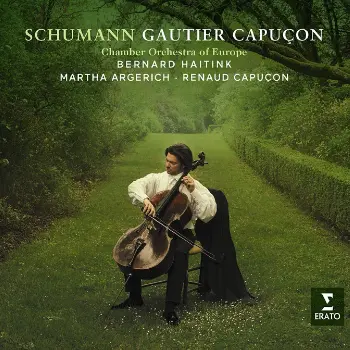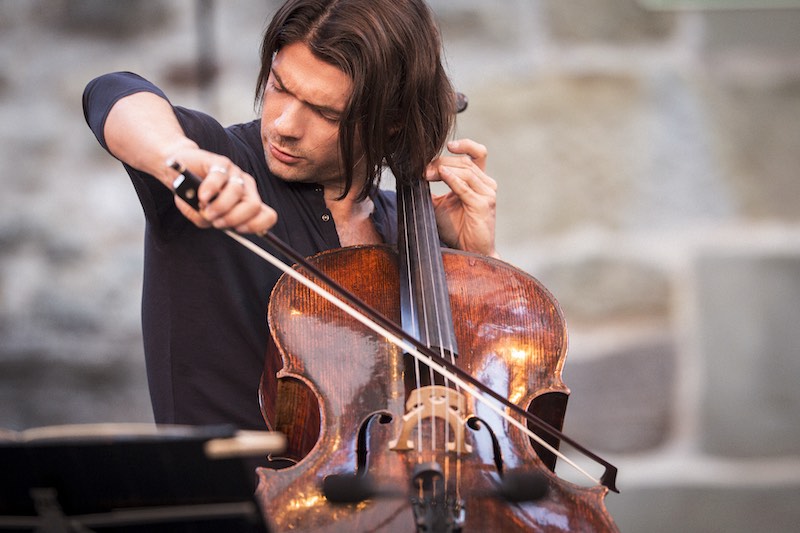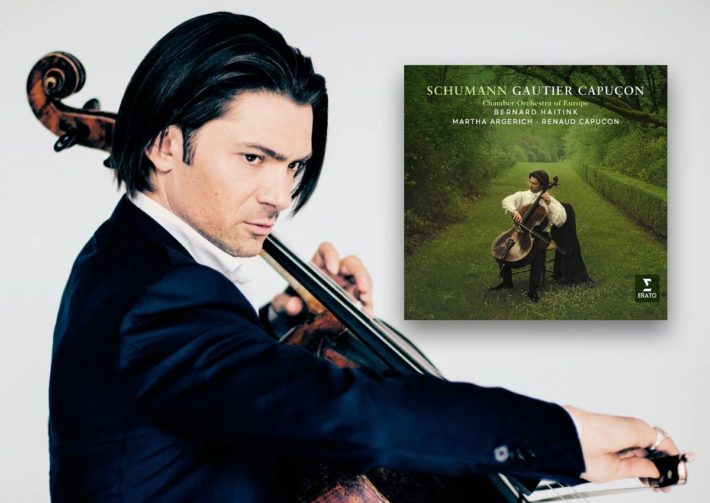Maybe we should start with the bottom line: Gautier Capuçon’s fans, and there are many, will not be disappointed with this heavily marketed release, for his talent, beauty of tone and supreme execution are present on both the Schumann Cello Concerto and the chamber works. Long Admirers of the Schumann Cello Concerto, on the other hand, will need to spend some time with this album, for its qualities are not immediately apparent on first listening.

Schumann’s Cello Concerto is a tough piece to pull off; For one, the orchestration is a bit thin, almost transparent compared to the composer’s Symphonies or Piano Concerto. In this case, a larger symphony orchestra can serve the scale and balance of the score well. But here we have a chamber orchestra already proving one can hear 19th-century large-orchestral pieces quite convincingly, as shown on this group’s symphonies cycle with Yannick Nézet-Séguin. And so it’s rather disappointing to realize the COE contribution under Bernard Haitink here, and especially in the tricky first movement, sounds a bit pale and lacking in character. The celebrated woodwind of this ensemble, coming from the best soloists and orchestras in the world, are proficient as ever, but the strings sound far away in the recording and are almost missing in action when giving support (or lack of) to the soloist.
This is partially due to the recording. Capuçon is recorded rather close, with the orchestra sounding far away behind, and the famous resonance of the Concertgebouw is not helping with focusing certain sections of the group. The dialogue between all parties from around 4:00 in the first movement is a good example. Capuçon is exemplary, but the intimidating short calls from the strings are not meeting him in the same energy required to build the tension towards the recapitulation coming later on in the movement (07:00). Sol Gabetta recent take on this concerto and movement is far more convincing, also with a small scaled orchestra. Compared to the latter, Capuçon on this point is anticlimactic. Mischa Maisky’s second take on the concerto (with the same chamber fillers and accompanist) is also stormy, more forceful and characteristically supported by the (also small scaled) Orpheus Orchestra.
Nothing wrong with the slow movement, though. There is a remarkable serenity and inward-looking quality in the soloist and here, where mostly woodwinds are in the supporting role, the dialogues are much more effective. And how lovely are the soloist’s control of bow and vibrato in the double stops figurations from around 1:30, or the Forte passage near the end of the movement, which cries out most movingly without sounding too tense, a little reminiscent of Yo Yo Ma’s celebrated account form the late 80’s. Something improves in the partnership in the third movement, where the louder sections of the piece allow the orchestra to play more freely. Capuçon is properly playful within a dark frame of mind, his low registers and quick finger work in the middle of the movement is impressive as always.

Chamber Works With Argerich
The chamber works with pianist Martha Argerich which generously fill this album come from performances made at Verbier Festival, and already released as separate box sets from this label. The performances are a delight without exception, and very well captured, with Argerich multicolored sound omnipresent throughout. Argerich gives identical repertoire as a fill to Mischa Maisky’s second version of the Cello Concerto (minus the Op. 88, DG), with more capricious accounts of these works, but this version is no less successful, and presents both artists at their absolute best.
From recent surveys of this repertoire, Sol Gabetta gives a more convincing account of the Concerto, and she is accompanied (on Op. 70, 73 and 102) by Bertrand Chamayou, interestingly playing a period instrument. The same program is emotionally (romantically?) played by Maisky, Argerich and the Orpheus orchestra and Maisky’s first version with the Vienna Philharmonic Orchestra under Bernstein still stands as a landmark. Fans of Capuçon will not hesitate, and the physical album includes lovely photos of the cellist posing as a 19th-century romantic figure taken by photographer Jamie Beck. Admirers of the concerto will perhaps want this as a second version to one of the references recording of this piece, some listed below.
Schumann – Cello Concerto, Chamber Works Op. 70, 73, 88, 102
Gautier Capuçon – Cello
Chamber Orchestra of Europe
Bernard Haitink – Conductor
Martha Argerich – Piano
Renaud Capuçon – Violin
Warner Classics / Erato, CD 190295634216




















